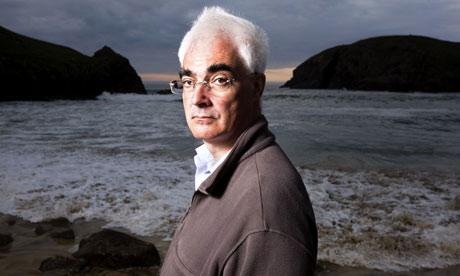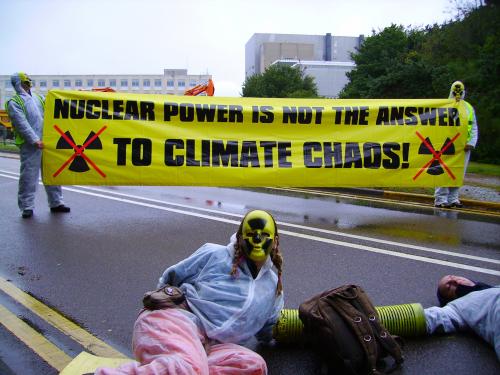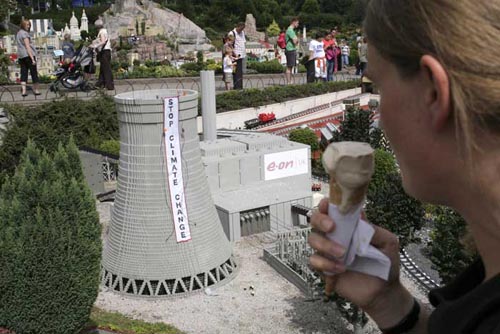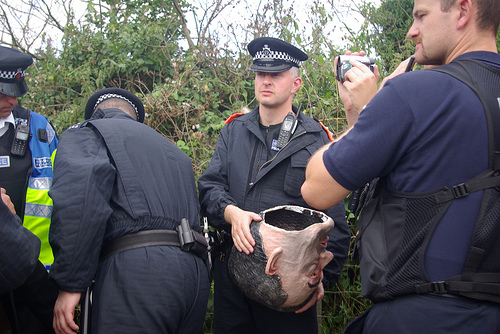
Yes, Hubbert was right about US oil, yes supply of a finite resource will eventually disappear in useable forms.
However oil reached around $150 a barrel this summer because of economic reasons not simply exhaustion of reserves.
From OPEC to speculation to lack of refinary capacity to conflict in the Middle East a host of factors has been driving the price up, I guess it could fall below $100.
I suspect it will never be cheap and yes oil addiction is unsustainable as I constantly argue, however like Schnews I think the effects of burning oil on the global biosphere are more of a threat than 'peak oil'. If we really were running out of oil the world would be a safer place.
Venezuela's large reserves explain why Chavez is always being attacked....the US want a tame government who will supply cheap oil to keep their SUVs on the road.
On to Schnews
God isn't Schnews good, I which could expand to a 100 page weekly glossy then I could use it to replace the Economist, diy anarchists they do seem to be the thoughtful and organised part of the green and red movement. Please send them your cash if you have any to spare, if you want to
donate go here.
PEAK SPOIL
AS SchNEWS DRILLS FOR THE TRUTH IN PEAK OIL THEORY...
From Transition Town workshops to the city slickers at the Financial
Times (to over-excited pieces in ill-researched journals like
SchNEWS), there’s been more and more interest in ‘Peak Oil’. Perhaps
it’s got something to do with the price of a barrel reaching $140+
(down to a mere $115ish at the mo), and more noticeably for most,
petrol at the pumps is at record highs. Not to mention UK power
companies pushing the burden on to punters with up to 35% price
increases.
So, is the reality of scarce energy really beginning to hit home? Is
the oil now running out?
The basic premise is what’s known as Hubbert’s Peak. Oil, a finite
commodity with an ever expanding demand, will reach its halfway point
somewhere in the early 2000s (now) and from then on will irreversibly
decline. Hubbert developed his theory in the 1950s when he predicted
that America’s domestic oil would peak by the mid 70s. In the mid-80s
they realised he was right. Since then others have taken his
predictions and expanded them to fit the whole globe, where the
consensus has been for a peak in the first decade of the 21st
century.
Scary stuff, and not just for gas guzzling SUV drivers but for all of
us; it’s oil that fuels the equipment that sows and reaps our crops
(and makes the pesticides to slowly kill us with blemish-free uniform
produce) and oil that fuels the trucks that drive the food to our
shops. Add to this plastics, fertilisers, and all the other by
products it becomes easy to predict apocalypse if the pumps ever run
dry (see SchNEWS 499).
Something like this actually happened not so long ago, back in the
‘90s, in that wacky dictatorship called North Korea. The
industrialised and oil dependent nation found itself without petroleum
after its sole provider - the Soviet Union - collapsed. The result was
that, far from western eyes, over a million people died as the
infrastructure collapsed. And, so warns the Peak Oil doomsayers, this
could happen on a global scale.
WELL WELL WELL
All of this has some anarcho-primitivists jumping with glee at the
prospect of the imminent collapse of earth-raping industrial
capitalist society. But, before you stock up on tinned goods, shotgun
cartridges and bottled water, here’s a few things to consider:
Firstly, there’s no oil shortage. This may come as a bit of a
surprise to all those who’ve been watching the prices rise and rise.
As the Saudis recently pointed out to outgoing President Bush -
pumping more oil won’t lower the price. Actually, there’s a glut of
oil in the supply markets. The Iranians (one of the oil nations
pumping under their maximum capacity) have tankers full of the stuff
that they just can’t shift because no one wants it. What’s lacking is
refining capacity.
While oil use in the US has increased 35% in the last 30 years, no
new refineries have been built to keep up with demand. The ability to
turn oil into petrol, diesel, aviation fuel etc is massively
underdeveloped by the oil corporations, who generally like to keep
refining to ‘safe’ (i.e. Western and friendly) countries. By
artificially creating a bottleneck in the amount of usable oil, the
price just goes up and up, leading to massive profits for the oil
business as this nice little scam can keep functioning. Exxon Mobil
made profits of $11.8 bn in the last quarter alone, and the other big
five oil companies are making similarly obscene dosh. The scam has
worked pretty well so far.
The predictions of world oil reserves are based on proven, reachable
oil. This is a tricky concept because, as it turns out, there’s a
whole lot of ‘unproven’ marginal oil that’s already making its way on
to world markets. The most known about of these are the tar sands of
Alberta, Canada. Until very recently (when the technology became
economical on a large scale) these were considered ‘unproven,’ yet a
lot of these are now making their way to the US (and world) oil
markets.
The tars sands, also known as bitumen, are a very dirty form of oil,
one that’s very expensive, polluting and energy hungry to exploit and
process. It takes the equivalent of one barrel of oil to extract six
barrels of oil from the tar sands. They also happen to be located in
an area of unspoilt natural wilderness, but hey, what profitable
minerals aren’t these days? Canada’s tar sands contain an amount of
oil in excess of that under Saudi Arabia’s sands. And exploiting them
is fast becoming its most profitable activity.
Venezuela has similar deposits of bitumen in Orinoco, and
significantly larger than Canada’s. They’re estimated at around 260
million barrels (i.e. another Saudi Arabia) on top of the 80 million
or so of ordinary oil. They’re easier to exploit than Canada’s and are
barely touched. It’s no wonder that the US has got such a keen
interest in the actions of Venezuelan President, Hugo the Chavmeister.
Industry experts had been saying that these areas will become among
the world’s future energy heartlands, but that until oil was worth
over $40 per barrel it was too expensive to develop. Oil’s now worth
over $100 and will be so for some time to come, so go figure.
CRUDE THOUGHTS
A real danger of Peak Oil, or rather, the fear of peak oil, is that
it risks handing states and corporations even more planet-wrecking
power. If people believe the oil is running out, then pressure from
consumers and businesses alike is to find more at any cost. This is
already being written into the US election strategy of the
republicans, where John McCain is promoting drilling in the Arctic
Circle as a way out of the energy ‘crisis’.
This could lead to a seriously deadly irony: The warnings of Peak Oil
by environmentalists could lead to the erosion of the public’s
psychological barriers protecting the few remaining areas of
wilderness left. There’s oil in unknown (but quite possibly huge)
quantities in Greenland, as well as plenty in Alaska, where the Bush
junta has already green-lighted the destructive process of exploring
and exploiting. The Russians have laid their claim to their chunk of
the Arctic Circle too, with an eye to expansion for more oil.
And, in a genuinely insane piece of economic logic, as global warming
melts the Arctic’s frozen seas, the previously unreachable oil
reserves that lay under the ice become more exploitable, and, as they
are burned, yet more undersea oil becomes available. Or if that runs
out there’s always the Antarctic…
And if these reserves still don’t prove to be quite enough to satisfy
demand, there’s always ole king coal. China, main producers of the
world’s plastic consumer tat, is rich in coal but virtually empty of
large oil deposits.
To keep their economy expanding at its current pace they are building
two coal fired power stations a week. However, they need oil as well
for their cars and trucks (and tanks). As oil’s expensive and foreign
suppliers can be notoriously unreliable (they haven’t as yet turned to
Amercian-style invasion of oil producers) what they really crave is a
domestic source of oil, which they don’t have.
Or at least didn’t, until they turned to the combined wisdom of the
Nazis and the apartheid-era South Africans. Both the Nazis during the
war and the South Africans during sanctions found it hard to import
oil. Luckily for them a German scientist found a way to turn coal into
synthetic oil, known as the Fischer-Tropsch Synthesis. It’s a very
energy hungry process (of course) and needless to say massively
polluting (obviously) but it does mean that, even if oil is tricky to
get hold of, you can just magic some out of coal - kind of like a very
dirty alchemy that’s bad for the planet.
China has already constructed its first huge synthetic oil refinery
in Chinese Mongolia.
PRICE OF SUCCESS?
The current cost of oil, often mistaken as a indicator of its
scarcity, is actually driven by far more complex forces.
As a commodity like any other, it’s traded on the international
markets via brokers. In recent years the power of the cartel that set
the price of oil, OPEC, has been significantly reduced, and now it’s
the speculators that call the shots on its price (more or less - OPEC
still caries a lot of weight, but it’s a player now rather than the
whole game). That means that, as long as the price of oil is rising,
speculators will push the price even higher.
It’s estimated that as much as 60% of the price of today’s oil is
pure speculation. To give an example of the logic of nonsense
capitalism: Today oil is worth, say $125 a barrel. As the price is
going up, you, a speculator, figure that if you buy some at that price
today, you can sell it in a week or two for $135. Because you’re
buying oil, other speculators have more confidence the price will
continue upwards, so they’re happy to pay $130 after you.
This continues until no one who actually needs to use oil for their
cars, homes or businesses etc. can even afford to refill their zippo
lighters, at which point the entire economy crashes, taking the price
of oil with it.
In fact, herein lies one of the central flaws in the theory of peak
oil - supply and demand: that fundamental essential of capitalism. If
the price of oil goes up as its demand goes up (and its availability
goes down) then at some point it will be too expensive for oil based
industrial capitalism to afford. At that point we enter a new
depression/recession. Businesses collapse, people can’t afford to run
their cars, factories grind to a halt and so on. The effect of a
depression means that, with the entire economy in free fall, the
demand for oil drops. As the demand drops so does its price, until at
some point people can afford to buy it again, and, hurrah, capitalism
reasserts itself (albeit in a leaner, less carbon-heavy form).
DRILLER KILLER
The truth is that the oil has already peaked for Western
multinationals. In the 70s, major Western oil giants controlled over
half the world’s oil, they now only own 13%. As Arjun Murti, an energy
analyst at Goldman Sachs puts it: “What we have now is geopolitical
peak oil.”
There’s plenty of oil left, but it’s all in either politically
unstable / US-unfriendly states (Iraq, Iran, Russia) or difficult and
expensive to get at (the Arctic, Canadian tar sands). These
alternative sources of fossil fuels could keep us going well into the
future, past our lifetimes and maybe even that of our grandchildren.
The problem is: exactly that. The effect of burning a trillion tons of
coal and perhaps a trillion barrels of oil is that the planet will
burn up faster than a petrol-soaked moth near a candle. The
Intergovernmental Panel on Climate Change (the world’s leading
authority) predict a global temperature rise of at least 3°C by 2050,
with further predictions that CO² and climate temperatures will rise
and rise.
Mother nature has been steadily locking away excess carbon under the
ground for the last three billion years in order to maintain a steady,
liveable temperature for all of us life-forms. Suddenly, us wayward
children have begun reversing the process, sticking it back in the
air. In the process we’re experimenting with the atmosphere on an
unprecedented scale, causing massive changes to the climate and
biosphere, driving many species to extinction on a par with the
extinction of the dinosaurs.
The real problem isn’t that we’re going to run out of fossil fuels.
The problem is what happens when we don’t...



















